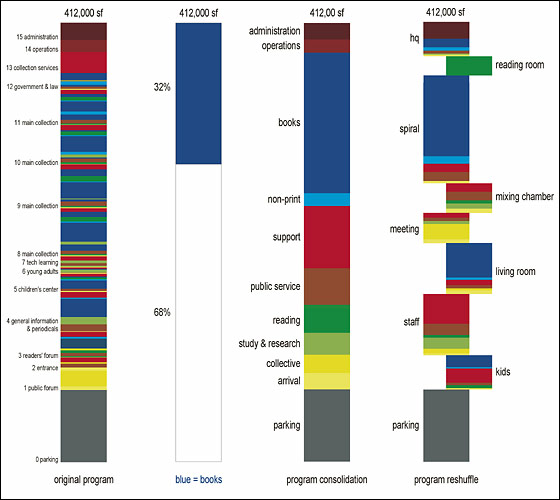It’s Real Estate Monday in the blogosphere. The LES’s resident WASP, Lockhart Steele puts to rest all those inappropriate discussions about who owns the New York real estate industry with the launch of his new weblog, Curbed. It’s the Fleshbot of real estate porn.
Meanwhile, on the producing end, Paul, Javier & co have thrown open the doors on Archinect v2.0. The site’s as surprisingly massive as Time Warner Center, only good; as technologically advanced as Terminal 2E at Roissy, only still standing.
And not last or least, Chicagoist launched today, too; since architecture’s one of the few cool things going in Chicago [the cows were bad enough, people. HELLO!], they post a lot about architecture and buildings both significant and otherwise.
Soon, all bloggers will have brokers, too
It’s Real Estate Monday in the blogosphere. The LES’s resident WASP, Lockhart Steele puts to rest all those inappropriate discussions about who owns the New York real estate industry with the launch of his new weblog, Curbed. It’s the Fleshbot of real estate porn.
Meanwhile, on the producing end, Paul, Javier & co have thrown open the doors on Archinect v2.0. The site’s as surprisingly massive as Time Warner Center, only good; as technologically advanced as Terminal 2E at Roissy, only still standing.
And not last or least, Chicagoist launched today, too; since architecture’s one of the few cool things going in Chicago [the cows were bad enough, people. HELLO!], they post a lot about architecture and buildings both significant and otherwise.
Cannes, you believe it?
bwahahahaha.
I feel the same way about Michael Moore’s masterful PR march to the Palme d’Or as Patrick Lang, ex-Pentagon Middle East intelligence chief feels about how Cheney & co were utterly duped by the Iranian intelligence agency and their frontman, Ahmed Chalabi:
“[It was] one of the most sophisticated and successful intelligence [insert ‘buzz-generating’ here] operations in history… I’m a spook. I appreciate good work. This was good work.”
Cannes, you believe it?
bwahahahaha.
I feel the same way about Michael Moore’s masterful PR march to the Palme d’Or as Patrick Lang, ex-Pentagon Middle East intelligence chief feels about how Cheney & co were utterly duped by the Iranian intelligence agency and their frontman, Ahmed Chalabi:
“[It was] one of the most sophisticated and successful intelligence [insert ‘buzz-generating’ here] operations in history… I’m a spook. I appreciate good work. This was good work.”
Whistle must be going into turnaround
The terminal bureaucracy squanders treasure (and, in the case of the state), life in pointless, oft times criminal endeavours, whose true purpose is nothing more than make-work for those employed to demonstrate, in their inactive mass – the power of the institution.
The young, warped by an educational system selling them perpetual adolescence, mistake the battleground for the struggle: they believe that make-work in that one-time area of strife and creation, Hollywood, somehow conveys to them the status of actually working in the Movie Business. It is as if a picnicker at the Gettysburg Memorial Park considered himself a soldier.
David Mamet eviscerates development, “the Dadaist vision of movie-making,” in the Guardian
Whistle must be going into turnaround
The terminal bureaucracy squanders treasure (and, in the case of the state), life in pointless, oft times criminal endeavours, whose true purpose is nothing more than make-work for those employed to demonstrate, in their inactive mass – the power of the institution.
The young, warped by an educational system selling them perpetual adolescence, mistake the battleground for the struggle: they believe that make-work in that one-time area of strife and creation, Hollywood, somehow conveys to them the status of actually working in the Movie Business. It is as if a picnicker at the Gettysburg Memorial Park considered himself a soldier.
David Mamet eviscerates development, “the Dadaist vision of movie-making,” in the Guardian
My People, My Ironing People


Cue up the Neil Diamond. Like a boatload of immigrant philosophers, chasing in this Continent’s divinely appointed promises, the magically aestheticized transcendance of the twin landscapes of Caspar David Friedrichian Nature and Henri Fantin Latourian Domesticity, Extreme Ironing is comin’ to America.
I only care because I care enough to have made a movie about ironing, Extremely Sentimental Ironing, you might say, which was set in that Land of Milk and Honey where Asian and Central American immigrants step into the dreams once pursued by Mormon pioneers from Western Europe.
[Note: If all you want is someone to read the Times for you unembellished, watch ,a href=”http://www.ny1.com”>NY1.]
My People, My Ironing People


Cue up the Neil Diamond. Like a boatload of immigrant philosophers, chasing in this Continent’s divinely appointed promises, the magically aestheticized transcendance of the twin landscapes of Caspar David Friedrichian Nature and Henri Fantin Latourian Domesticity, Extreme Ironing is comin’ to America.
I only care because I care enough to have made a movie about ironing, Extremely Sentimental Ironing, you might say, which was set in that Land of Milk and Honey where Asian and Central American immigrants step into the dreams once pursued by Mormon pioneers from Western Europe.
[Note: If all you want is someone to read the Times for you unembellished, watch ,a href=”http://www.ny1.com”>NY1.]
Muschamp/Koolhaas Piss Me Off. Again

But not how you think. I was really getting into my Muschamp- and Koolhaas-weary groove. So when Herbert opened his review of Rem’s new Seattle Central Library, with this sentence, I was working up my jaded, righteous indignation: “In more than 30 years of writing about architecture, this is the most exciting new building it has been my honor to review.”
But not only is the review NOT annoying, it’s excellent, enthralling, even. And the building sounds phenomenal. I AM SO PISSED. The diagram above, for example, shows how OMA transformed the client’s activities and requirements into the structure of the building–which it does, and with dramatic, remarkable and usable effect. Damn. Fine stuff.
Muschamp/Koolhaas Piss Me Off. Again

But not how you think. I was really getting into my Muschamp- and Koolhaas-weary groove. So when Herbert opened his review of Rem’s new Seattle Central Library, with this sentence, I was working up my jaded, righteous indignation: “In more than 30 years of writing about architecture, this is the most exciting new building it has been my honor to review.”
But not only is the review NOT annoying, it’s excellent, enthralling, even. And the building sounds phenomenal. I AM SO PISSED. The diagram above, for example, shows how OMA transformed the client’s activities and requirements into the structure of the building–which it does, and with dramatic, remarkable and usable effect. Damn. Fine stuff.
Hitchhiker’s Production Blog to the Galaxy
Disney launched a production weblog for Hitchhiker’s Guide to the Galaxy this week. Let’s see if they’ve learned anything since 2002, when Miramax published a completely artificial “weekly production diary” site for Full Frontal . The gap between between weeks 3 and 4 was like three months.
Hitchhiker’s Production Blog to the Galaxy
Disney launched a production weblog for Hitchhiker’s Guide to the Galaxy this week. Let’s see if they’ve learned anything since 2002, when Miramax published a completely artificial “weekly production diary” site for Full Frontal . The gap between between weeks 3 and 4 was like three months.
WPS1: Let’s put on a [radio] show!
 Umm… I was excited for the launch of WPS1: Art Radio, the new online audio programming wing of PS1. Launched three weeks ago, WPS1 is daily mp3 streamed programming in three broad categories: awesome, edge music from all over; rare and archival artist recordings from parent/affiliate MoMA’s library; and self-produced art-related talk/interview shows. Well, 2 out of 3 ain’t bad.
Umm… I was excited for the launch of WPS1: Art Radio, the new online audio programming wing of PS1. Launched three weeks ago, WPS1 is daily mp3 streamed programming in three broad categories: awesome, edge music from all over; rare and archival artist recordings from parent/affiliate MoMA’s library; and self-produced art-related talk/interview shows. Well, 2 out of 3 ain’t bad.
After listening to a dozen or so art talk shows on WPS1, I find them almost unlistenable. Excruciatingly amateurish, painfully ad hoc. Can I say it? I have to. They BLOOOOOWW.
Which really blows, because I’m a fan of PS1. A lot of cool people; in-tune, even daring curators; great artists, great opportunities for new artists; great music, especially in the summer; a very refreshing and energetic institution. I even know a few of the people involved in WPS1 and have been anticipating the launch for months.
?: $
“What does he whisper to her at the end?”

It’s the most annoying question I kept getting from Lost in Translation fans. Well, now’s your chance to find out.
Over at Greencine, David’s collecting captions for this pic.
My choices:
“Why’d I write 115 pages if you can win one with a 12-page outline?”
“Let’s get your mother to film us later.”
“I didn’t wash my hands.”
“I’m gunning for that MoMA award next year.”
But I finally went with, “I’ve got a can of wine with your name on it back in my suite.”
